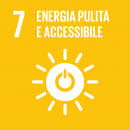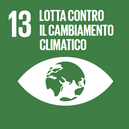New Perspectives in Energy for a Sustainable Growth – Proff. Giulia Grancini, Claudia Lupi, Giuseppe Tannoia, Michele De Bastiani
- 09, 07, 2022
In this course a general overview on the climate actions, with reference to SDG 13 and 7 will be provided, discussing the challenges in the framework of the European Green Deal plan.
Title: New Perspectives in Energy for a Sustainable Growth
Provider University of Pavia, Prof. Giulia Grancini, Prof. Claudia Lupi, Prof. Giuseppe Tannoia, Michele De Bastiani
Date: 22nd, 25th, 29th January 2024 (10.00 -12.00 am)
CONTENTS OF THE COURSE
Introduction to Climate Change and Sustainability Challenges
Framework on energies and SDGs #7 #13
Decarbonization, geological storage and carbon dioxide mineralization
Solar Energy: challenge, potential and new technology
Cost and Limits of current solar technology and economic frame
CLASSES
1st Class: 22nd January 2024, 10.00 am. Link to Zoom here
2nd Class: 25th January 2024, 10.00 am. Link to Zoom here
3rd Class: 29th January 2024, 10.00 am. Link to Zoom here
Description of the course
In the 2030 Agenda for Sustainable Development, Member States express their commitment to protect the planet from degradation and take urgent action on climate change. The Agenda also identifies, in its paragraph 14, climate change as “one of the greatest challenges of our time” and worries about “its adverse impacts undermine the ability of all countries to achieve sustainable development. To face climate change science and technology have to create new solutions for the social development, developing concrete actions to mitigate the global crisis. The world is making good progress on increasing access to electricity and improving energy efficiency. However, millions of people throughout the world still lack such access, and progress on facilitating access to clean cooking fuels and technologies is too slow. Among others, the field of renewable energy is in great expansion. The renewable energy share of total final energy consumption gradually increased, from 16.3 per cent in 2010 to 17.0 per cent in 2015 and 17.3 per cent in 2017, but faster growth is required to meet long-term climate goals. As mentioned in the most recent Report from the International Energy Agency (IEA), renewables will lead the energy transition to a greener and sustainable world. In this course we will tackle this challenge showing how renewable energies have developed in the last year, with a special focus on solar energy, as “the new king” among renewables (defined by IEA).
In this course a general overview on the climate actions, with reference to SDG 13 and 7 will be provided, discussing the challenges in the framework of the European Green Deal plan. Then, the course will provide a broad overview on the current energy scenario and the different energy solutions highlighting advantages and issues. In addition, the course will present different perspectives on the technologies for decarbonization, geological storage and carbon dioxide mineralization along with a more detailed discussion on the most recent nanotechnological solutions and advanced in science and research. In particular, among others, the course will focus on solar energy, as a mainstream technology in the energy field. The so-called new generation solar technologies will be discussed and presented, with a special focus on the modern solutions in the photovoltaic field. Finally, an overview on the cost and on economic evaluation of the solar energy will be presented.
Learning outcomes:
1. Frame of climate change and sustainability challenge (SDG13);
2. Framework on energies and SDG 7 goals;
3. decarbonization, geological storage and carbon dioxide mineralization;
4. Solar Energy: challenges and potential;
5. New photovoltaic technology for addressing modern solution (i.e. integrated photovoltaics);
6. Cost and Limits of current solar technology and economic frame.
How: in streaming on-line
Credits: 1 (8 hours)
Time period: January 2024
Any prerequisites: Interest on Sustainability (SDG7, SDG 13), Climate Change, Energy challenges, Modern Photovoltaics.
Learning resources: Slides and scientific papers available on the course Kiro page.
Type of assessment: Multiple choice test. The test is composed of 19 questions; the time available to complete the test is 45 minutes. It will be available on the Kiro plaftorm (at this link). The test will be accessible from 2h00 to 4h00 pm, with 45 minutes available to complete it.
Dates of the assessment: to be communicated
Quality assurance: University of Pavia


